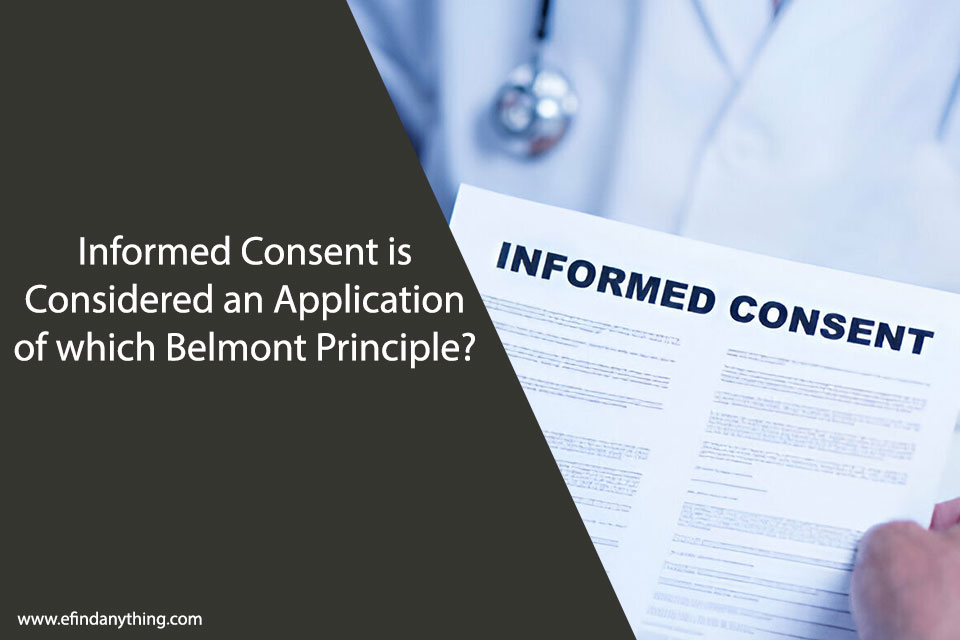Informed consent is key in medical and research ethics. It makes sure patients know the risks and benefits of treatments or studies. The Belmont Principle, from 1979, guides ethical decisions in these fields. It highlights the importance of informed consent, linking it to respect, beneficence, and justice.

Informed consent is deeply connected to the Belmont Principle. This connection helps us see its value in research and medical ethics. It shows how informed consent is a key part of the Belmont Principle’s principles.
Table of Contents
Key Takeaways
- Informed consent is a critical component of medical ethics and research ethics.
- The Belmont Principle provides a framework for ethical decision-making in biomedical and behavioral research.
- Informed consent is an application of the Belmont Principle, emphasizing respect for persons, beneficence, and justice.
- Research ethics and medical ethics rely heavily on informed consent to ensure patient autonomy and self-determination.
- The Belmont Principle has been a cornerstone of research ethics and medical ethics since its establishment in 1979.
Understanding the Belmont Principles
The principles of bioethics are key in healthcare ethics. They focus on patient autonomy, which means respecting people’s right to make their own care choices. The Belmont Principles, from the Belmont Report, help apply these ideas in research and healthcare.
In healthcare, the Belmont Principles give us three main rules: respect for persons, doing good (beneficence), and fairness (justice). These rules help protect patients’ rights and ensure they get the best care. They help healthcare workers make choices that put patients first.
Origin of the Belmont Report
The Belmont Report came out in 1979. It was a big step in making sure research and healthcare ethics were on the right track.
Core Ethical Guidelines
The Belmont Report’s main guidelines are:
- Respect for persons: this means valuing patient autonomy and getting their consent
- Beneficence: this is about making sure patients are safe and well
- Justice: this ensures patients get fair treatment
Historical Context and Development
Since they were first introduced, the Belmont Principles have grown a lot. Now, they are a key part of healthcare ethics. They guide us to put patients’ needs and autonomy first.
The Fundamental Nature of Informed Consent
Informed consent is key in healthcare decision-making. It makes sure patients know what’s happening and can decide for themselves. This idea comes from valuing each person’s freedom and choice.
For informed consent, patients need to know, understand, and choose freely. It’s not just a law; it’s a way to show respect for patients. It helps build trust and makes sure care fits each person’s needs.
Some good things come from informed consent:
- Improved patient outcomes
- Increased patient satisfaction
- More patient autonomy and self-determination
- Better treatment plan following
Informed consent is a team effort. It’s about talking and working together. It helps patients make choices that are right for them, making care more personal and effective.
Putting informed consent first helps care focus on the patient. It’s a big part of doing the right thing in healthcare. It builds trust and respect between patients and doctors.
| Benefits of Informed Consent | Description |
|---|---|
| Improved patient outcomes | Promotes better health outcomes and increased patient satisfaction |
| Increased patient satisfaction | Enhances patient autonomy and self-determination, leading to increased satisfaction with care |
| Enhanced patient autonomy | Respects patients’ rights to make informed decisions about their care, promoting autonomy and self-determination |
Informed Consent is Considered an Application of which Belmont Principle: The Direct Answer
Informed consent is key in bioethics, based on the Belmont Principle of respect for persons. This principle values autonomy and self-determination. It ensures people can decide about their care.
The Belmont principles, set in 1979, guide ethical decisions in research and healthcare. The principle of respect for persons is central. It emphasizes the autonomy and dignity of individuals. Informed consent reflects this, requiring patients to be fully informed and able to decide about their care.
Respect for Persons as the Foundation
The principle of respect for persons is about individuals’ right to decide about their lives and bodies. It’s linked to autonomy, which means making decisions without coercion. Informed consent is a key part of this, ensuring decisions are made freely.
Autonomy and Self-Determination
Autonomy and self-determination are crucial in informed consent. People must decide about their care without external pressure. They need to know their options and make choices based on their values.
The principle of beneficence also plays a role. It focuses on the well-being and safety of the individual. Healthcare providers must act in their patients’ best interests, ensuring they receive the best care.
| Belmont Principle | Description |
|---|---|
| Respect for Persons | Recognizes the autonomy and dignity of individuals |
| Beneficence | Prioritizes the well-being and safety of the individual |
| Justice | Ensures that individuals are treated fairly and without bias |
Components of Valid Informed Consent
Informed consent is key in medical research and patient care. It makes sure people know their rights and the risks and benefits of treatments or studies. It needs clear disclosure, understanding checks, and proper records.
Disclosure Requirements
Patients must know the risks and benefits of treatments or studies. This means giving them all the facts about the purpose, how it works, and what might happen. It’s all about respecting their choices and rights.
Comprehension Assessment
It’s important to check if patients understand the information given. This can be done with quizzes, interviews, or watching how they react. This way, doctors can make sure patients are making smart choices about their health.
Documentation Standards
Keeping good records is vital for the consent process. It includes all the details of what was said, what the patient understood, and their choice. This way, doctors can make sure patients’ rights are kept safe and that consent is given fairly.
The Role of Beneficence in Informed Consent
In healthcare and medical research, beneficence is key. It ensures patients’ well-being and best interests are looked after. This principle is based on ethics and is crucial for trust between patients and healthcare providers.
Healthcare professionals focus on beneficence to give care that benefits patients. They respect patients’ patient rights and freedom to make choices.
Some important parts of beneficence in informed consent are:
- Promoting the well-being and best interests of patients
- Ensuring that patients are fully informed and able to make decisions about their care
- Respecting patients’ autonomy and self-determination
- Providing care that is free from harm and exploitation
By adding beneficence to informed consent, healthcare providers show they care about ethics and patient-centered care. This leads to better health outcomes, happier patients, and more trust in healthcare. As healthcare changes, the role of beneficence in informed consent will grow, shaping the future of healthcare and medical research.
Justice and Fair Subject Selection
Informed consent is all about fairness and justice. It makes sure patients are picked fairly and that everyone gets a fair share of benefits. This means picking participants without bias, avoiding things like race or gender.
It’s also about making sure everyone gets a fair chance to benefit from research. For example, in a clinical trial, everyone should get the same treatment, no matter who they are.
Equitable Distribution of Benefits
To make sure benefits are shared fairly, researchers need to give everyone the same information. They should make sure all participants can give informed consent. They also need to reduce risks and treat everyone with respect.
Protection of Vulnerable Populations
Groups like children, prisoners, and those with mental disabilities need extra care. Researchers must protect them from being taken advantage of. They should provide extra support to help these groups make informed choices.

By focusing on justice and fairness, researchers can make sure consent is truly informed. This requires a commitment to fairness and protecting vulnerable groups. It’s about treating everyone with respect and dignity.
Modern Applications in Healthcare Settings
In today’s healthcare world, informed consent is key. It helps promote patient autonomy and patient rights. This is seen a lot in medical research, where people need to know the risks and benefits.
Healthcare providers make sure patients are informed. This lets patients make choices that fit their values and needs.
Informed consent is used in many ways in healthcare. It’s not just for clinical trials. It’s also for everyday decisions in healthcare. For example, patients can say yes or no to treatments. Healthcare providers must respect their autonomy.
Some important parts of informed consent today include:
- Clear communication of treatment options and potential outcomes
- Respect for patient autonomy and decision-making capacity
- Protection of patient rights and dignity
By focusing on informed consent, healthcare providers can gain trust. They ensure patients get care that’s centered on them. As healthcare changes, informed consent will become even more crucial, in medical research and healthcare innovation.
Challenges in Obtaining Informed Consent
Getting informed consent is key in healthcare, but it’s hard in some cases. Language and cultural differences are big hurdles. If patients and doctors don’t speak the same language, it’s tough to explain treatment risks and benefits.
Another issue is figuring out if a patient can make informed choices. Healthcare workers must check if a patient can decide about their care. Emergency situations make it even harder, as patients might not have time to think about their options.
The main challenges in getting informed consent are:
- Language and cultural barriers
- Capacity assessment issues
- Emergency situations
To tackle these challenges, healthcare providers can use interpreters or translated materials. They can also do thorough assessments and keep detailed records. This ensures patients can make informed choices.

Understanding these challenges helps healthcare providers improve patient care. They might use simple language or visual aids. They could also offer more support and resources to help patients make informed decisions.
Digital Age Considerations for Informed Consent
In today’s digital world, getting informed consent is more complex. Electronic consent forms are now common. They make it easy for patients to agree and keep records online.
Telemedicine has also changed the game. It brings new telemedicine challenges for getting consent. But, new tech and strategies help tackle these issues.
Some important digital age considerations for consent include:
- Ensuring patients get clear, accurate info on treatment options
- Allowing patients to ask questions and share concerns
- Making sure consent is private and secure
Overall, electronic consent forms and telemedicine challenges are big parts of digital age considerations. By facing these challenges head-on, healthcare providers can give patients the best care.
Legal Framework and Regulatory Requirements
Getting informed consent involves a detailed legal framework and regulatory requirements. In the U.S., HIPAA and FDA rules are key in guiding this process.
Some important parts of the regulatory requirements are:
- Rules for what must be shared in consent
- Tests to check if patients understand
- Standards for keeping consent records
It’s vital to know the legal framework and regulatory requirements for informed consent. This ensures the process is both legal and ethical. By following these rules, healthcare providers can safeguard their patients’ rights and well-being.
As healthcare changes, keeping up with regulatory requirements and legal framework for informed consent is essential. This helps healthcare providers work confidently in a complex world. It also makes sure patients get the best care possible.
Conclusion
In healthcare, informed consent is key to ethical care. It’s based on the Belmont Principle, which values respect, doing good, and fairness. This principle helps healthcare providers and patients work together, building trust.
With new tech like telemedicine, informed consent must keep up. It’s important to overcome language and cultural barriers. Also, making sure patients can make their own choices is crucial.
Looking ahead, sticking to informed consent is vital. It ensures care is both compassionate and focused on the patient. As healthcare gets more complex, informed consent will guide us, keeping patients’ rights and well-being first.
FAQ
What is the Belmont Principle, and how is informed consent considered an application of it?
The Belmont Principle was set up in 1979. It guides ethical decisions in research. Informed consent is key to this principle, showing respect for people’s choices and rights.
What are the core ethical guidelines outlined in the Belmont Report?
The Belmont Report outlines three main ethics: respect for persons, doing good (beneficence), and fairness (justice). These are the core of ethical decision-making in healthcare and research.
What is the fundamental nature of informed consent in healthcare decision-making?
Informed consent is crucial in healthcare. It makes sure patients know and can decide about their care. It’s based on respecting people’s choices and rights.
How is informed consent an application of the Belmont Principle of respect for persons?
Informed consent follows the Belmont Principle of respect for persons. This principle values people’s freedom and ability to make their own choices. Informed consent ensures patients can make informed decisions about their care.
What are the key components of valid informed consent?
Valid informed consent has several parts. Patients must be told about the risks and benefits. They must understand this information. And the whole process must be documented.
How does the principle of beneficence play a role in informed consent?
Beneficence is about doing good for patients. In informed consent, it means patients are well-informed. This helps them make choices that are best for them.
How does the principle of justice relate to informed consent and fair subject selection?
Justice is about fairness in research. In informed consent, it means patients are chosen fairly. It also ensures benefits are shared fairly, protecting vulnerable groups.
What are some modern applications of informed consent in healthcare settings?
Informed consent is used in many healthcare areas today. This includes clinical trials and making healthcare decisions. It’s key for patient rights and autonomy.
What are some of the challenges in obtaining informed consent?
Getting informed consent can be hard. Issues like language barriers and emergency situations make it tough. We need to find ways to overcome these challenges.
How has the digital age introduced new considerations for informed consent?
The digital age brings new challenges for informed consent. This includes electronic forms and telemedicine. We must adapt to these changes to keep informed consent effective.
What is the legal framework and regulatory requirements for informed consent?
Informed consent has legal and regulatory rules. Laws like HIPAA and FDA guidelines are important. Following these rules is essential for ethical and legal informed consent.





